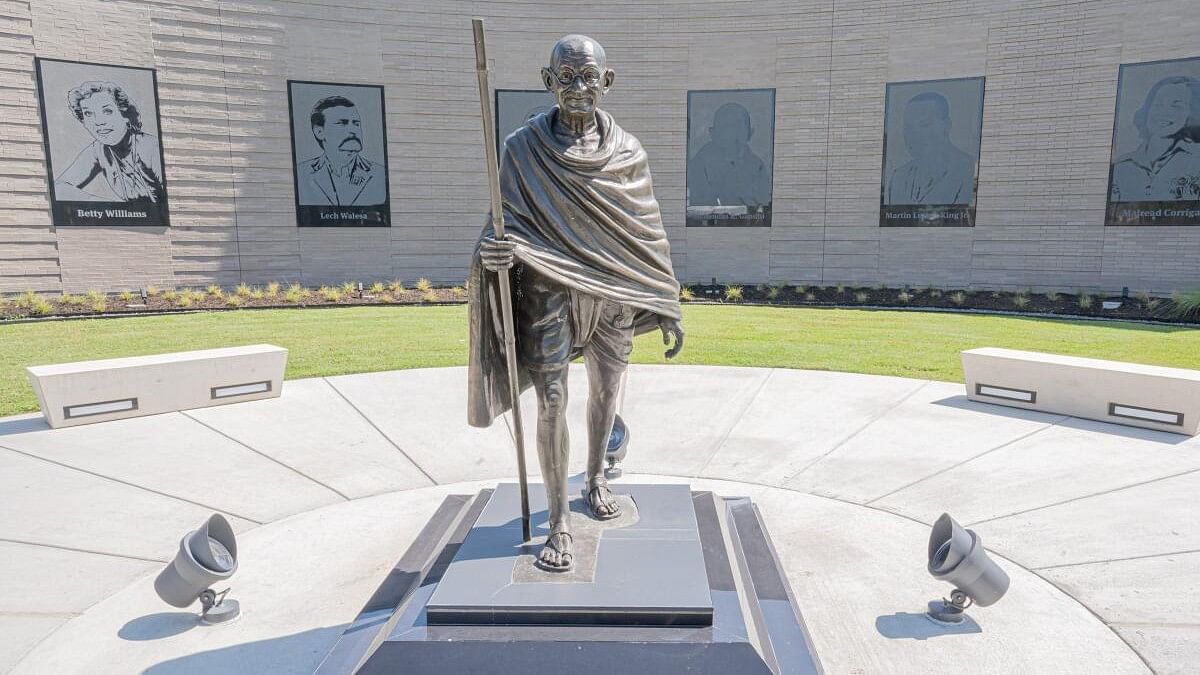
The statue of Mahatma Gandhi at Gandhi Museum, in Houston, Texas.
Credit: PTI File Photo
At one point of time, the British colonial enterprise gloated that the sun never set on the British Empire. A simple half-clad man in a dhoti galvanised people, shook that mighty empire, and contributed to the Independence of India. In his very simple and yet profound words, Mahatma Gandhi inspired millions of Indians to wage a heroic struggle against colonial rule and succeeded in securing freedom that Indians cherish today. Armed with twin pillars of truth and non-violence, he also inspired many similar movements across the world.
American journalist Webb Miller was an eyewitness to the Dandi march. Commenting on the police violence on unarmed satyagrahis at Dharasana, he expressed disbelief about how they did not even raise their arms to fend off blows from steel-tipped lathis, despite being beaten to pulp. As one row of injured satyagrahis were removed by the volunteers, another row boldly took their position. Looking back, Gandhi was an extraordinary communicator who united millions of men and women and imbued them with a higher purpose.
Speaking of Mahatma Gandhi, famous physicist and Nobel Laureate Albert Einstein said: "Generations to come will scarce believe that such a one as this ever in flesh and blood walked upon this earth."
His birth anniversary is an occasion for introspection not only for India but indeed for the entire world. Today, when we look around, we find serious challenges to international peace and security and even threats of the use of nuclear weapons. The world is yearning for peace and is waiting for an apostle of peace like Gandhi. Many decades ago, Gandhi said, “Peace will not come out of a clash of arms but out of justice lived and done...”
There are many important things to learn from his life and teachings. He held a high regard for service and tried to see God through the service of humanity. In his own profound words, Gandhi said, “The best way to find yourself is to lose yourself in the service of others." In a world wrecked by crude inequities, his message is very significant. Gandhi urged everyone to be the change they wanted to see in the world.
Today, we find many people are being discriminated based on gender, caste, race, religion, national or social origin, sexual orientation, disability, or any other status. Article 17 of the Constitution of India prohibited untouchability in all its forms, and yet it persists in some pockets of the country. Sometimes, people from the scheduled castes are not allowed to celebrate their marriage with pomp and take out processions in some parts of India. Speaking about discrimination and the need to address it, Mahatma Gandhi said, “It has always been a mystery to me how men can feel themselves honoured by the humiliation of their fellow beings.”
Speaking of the relationship between rights and duties, Gandhi, in a letter to Julian Huxley, director-general, UNESCO said, “I learnt from my illiterate but wise mother that all rights to be deserved and preserved came from duty well done." He regarded the performance of one’s duties as a part of citizenship responsibilities.
As we proceed towards the goal of a Viksit Bharat by 2047, Gandhi’s enduring vision of wiping the tear from every eye will be significant. In fact, he gave a talisman for determining whether a particular action is right or wrong. He said that when you are overcome by any doubt in this regard, please recall the poorest and weakest person whom you may have seen and ask yourself if the step you contemplate is going to be of any use to him. A very powerful test indeed for our administrators, lawmakers, and the general public. There is a lot more we need to do to inculcate his ideas, practice them every day, and make our nation a prosperous one.
Mahatma Gandhi identified ‘Seven Sins’ which must be shunned: “wealth without work; pleasure without conscience; knowledge without character; commerce without morality; science without humanity; religion without sacrifice; and politics without principles." We find numerous examples of these sins in our midst today. Despite Gandhi sceptics and Gandhi-baiters, his message has an enduring relevance.
(The writer is the Vice Chancellor of the Assam Royal Global University, Guwahati)